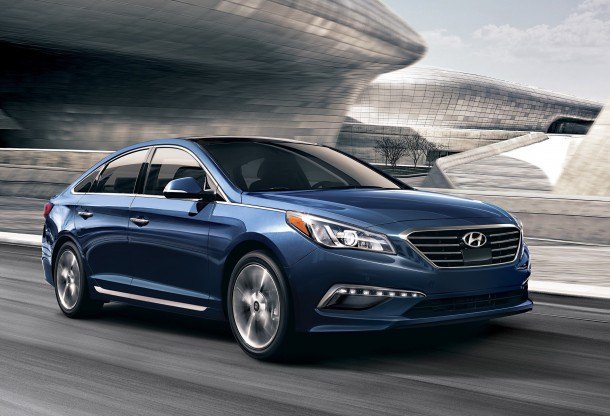Never Mind Last Year, Hyundai Has a Good Feeling About Its 2017 Sales Targets

There’s no shortage of uncertainty afflicting the auto industry these days, but Hyundai Motor Company is facing 2017 like a tense office worker determined to put on a brave face around its colleagues.
After seeing its 2016 delivery targets swamped by a wave of market reality — and after canning the CEO of its American division for missing his own targets — Hyundai claims the gray skies will clear up in the New Year.
The year 2016 is one Hyundai would prefer to forget. A Korean autoworker strike threw a wrench into its domestic operations, while changing consumer tastes in North America impacted its car-heavy lineup.
At home, the 12-week strike pushed sales down 7.8 percent last year, Bloomberg reports. Overseas, Hyundai and Kia sales dropped a collective 1.2 percent. It was the automaker’s first global decline in deliveries since the turn of the century — a collar-loosening case of sales fizzle after so many years of sizzle.
Now, just two weeks after firing its U.S. CEO and a week after reports of drastic cost-cutting measures, Hyundai is projecting sales growth of 4.7 percent this year. That means combined global sales of 8.25 million, up from last year’s 7.88 million. Rosy? Perhaps, but the automaker has a plan. A plan, it would seem, that existed before Dave Zuchowski’s termination.
The automaker promises new utility vehicles and improved product flow to the U.S., where sales actually rose in 2016. Hyundai recorded 768,057 sales in the U.S. last year, up from 761,710 in 2015. That increase occurred despite the buying public’s drastic turn away from passenger cars.
Besides the crossovers, the Genesis G70 luxury sedan should arrive next year to bolster the automaker’s overall sales tally. Still, the revamp of Hyundai’s crossover lineup won’t occur overnight, leaving the company’s targets sitting next to a big grain of salt. Reuters reports that the company’s own think tank predicted 1.9-percent growth for the coming year.
[Image: Hyundai Motor Company]

More by Steph Willems
Latest Car Reviews
Read moreLatest Product Reviews
Read moreRecent Comments
- Redapple2 Love the wheels
- Redapple2 Good luck to them. They used to make great cars. 510. 240Z, Sentra SE-R. Maxima. Frontier.
- Joe65688619 Under Ghosn they went through the same short-term bottom-line thinking that GM did in the 80s/90s, and they have not recovered say, to their heyday in the 50s and 60s in terms of market share and innovation. Poor design decisions (a CVT in their front-wheel drive "4-Door Sports Car", model overlap in a poorly performing segment (they never needed the Altima AND the Maxima...what they needed was one vehicle with different drivetrain, including hybrid, to compete with the Accord/Camry, and decontenting their vehicles: My 2012 QX56 (I know, not a Nissan, but the same holds for the Armada) had power rear windows in the cargo area that could vent, a glass hatch on the back door that could be opened separate from the whole liftgate (in such a tall vehicle, kinda essential if you have it in a garage and want to load the trunk without having to open the garage door to make room for the lift gate), a nice driver's side folding armrest, and a few other quality-of-life details absent from my 2018 QX80. In a competitive market this attention to detai is can be the differentiator that sell cars. Now they are caught in the middle of the market, competing more with Hyundai and Kia and selling discounted vehicles near the same price points, but losing money on them. They invested also invested a lot in niche platforms. The Leaf was one of the first full EVs, but never really evolved. They misjudged the market - luxury EVs are selling, small budget models not so much. Variable compression engines offering little in terms of real-world power or tech, let a lot of complexity that is leading to higher failure rates. Aside from the Z and GT-R (low volume models), not much forced induction (whether your a fan or not, look at what Honda did with the CR-V and Acura RDX - same chassis, slap a turbo on it, make it nicer inside, and now you can sell it as a semi-premium brand with higher markup). That said, I do believe they retain the technical and engineering capability to do far better. About time management realized they need to make smarter investments and understand their markets better.
- Kwik_Shift_Pro4X Off-road fluff on vehicles that should not be off road needs to die.
- Kwik_Shift_Pro4X Saw this posted on social media; “Just bought a 2023 Tundra with the 14" screen. Let my son borrow it for the afternoon, he connected his phone to listen to his iTunes.The next day my insurance company raised my rates and added my son to my policy. The email said that a private company showed that my son drove the vehicle. He already had his own vehicle that he was insuring.My insurance company demanded he give all his insurance info and some private info for proof. He declined for privacy reasons and my insurance cancelled my policy.These new vehicles with their tech are on condition that we give up our privacy to enter their world. It's not worth it people.”


































Comments
Join the conversation
I have a bad habit of judging car manufacturers by how quickly their moderately old cars rust. I saw an old (8yr?) Santa Fe which had bumper to bumper rust just yesterday. Then I read this. Anyway, I am not sure why somebody would buy one of these over a Honda or Toyota when resale value is considered.
I recently bought a new compact and shopped Hyundai, so I can say the product isn't really the problem. The Elantra is a thoroughly decent little car - it's not something an enthusiast would appreciate, but as a transportation appliance you'd drive for three or four years and then trade in, it beats the snot out a Corolla. I'd say the pricing and dealerships are the problem. And it's not that the pricing is "aspirational" - in reality, the price on the sticker is aspirational, but Hyundais are discounted VERY steeply. Dealers around here are advertising $4-5,000 off Elantras. And I suppose that's a decent dealership sales strategy, but it undercuts the perception of product quality, and doesn't build brand loyalty. If Elantras are as good as Civics or Corollas, then why are they giving them away? To make things worse, every Hyundai dealer I shopped wouldn't quote me lease figures over email. They all insisted I "come in and make my best deal." Yeah, right. Maybe that kind of thing doesn't matter to a 20-year-old community college student with 572 credit and two jobs at big-box stores, or a blue-light-special buyer, but it matters to someone like me. It was a no-sale moment for the car I was looking at, and for the whole brand in general. If they want to move upmarket, I'd suggest doing a Saturn-style pricing strategy - price the product where it should be to begin with, and eliminate the deals-a-plenty antics. Instead of stickering an Elantra at $21,000 and selling it for $17,000, why not sell it for $18,500, no haggle? At that price point, the car is a VERY solid value. With this kind of strategy, they could focus buyers' attention on the cars, and build some brand loyalty. I think the product is good enough to do that.